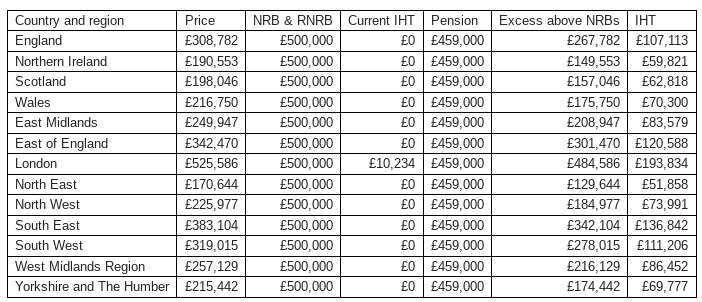London homeowners are going to be hit with an eye-watering 1,840 per cent increase in inheritance tax (IHT) liability, as a direct result of Rachel Reeves’ Budget changes, it has been calculated.
A single homeowner in the capital with an averaged priced home of £525,586, with the same amount in their pension, will have a liability of £194,000 in 2027, compared to only £10,000 today, according to wealth manager Quilter.
This comes after Chancellor Rachel Reeves announced major changes to inheritance tax in the Budget.
The Chancellor confirmed that she was extending the freeze on thresholds until 2030. The threshold freeze was due to expire in 2028.
Inheritance tax is applied at a flat rate of 40 per cent on estates worth over £325,000.
In the Budget, Reeves announced a freeze to the nil-rate band at £325,000 and residence nil-rate band (RNRB) at £175,00.

Single and childless homeowners can only shield £325,000 from IHT. This is because the £175,000 residence nil-rate band is only available to those leaving their main property to their direct descendants.
Couples with children can combine their allowances, allowing a widow or widower to pass on up to £1m tax-free.
Quilter said this means that as property values and other assets increase, more estates will become liable for inheritance tax.
New rules also included changes to inherited pension pots, which will be subjected to inheritance tax from April 2027, as well as a cap on relief on the inheritance of agricultural land and family businesses, both of which can be passed on tax free under current rules.
The tax relief available on inherited AIM shares was also set at 50 per cent “in all circumstances”.
The calculations by Quilter found that Brits across the country will have a massively inflated bill for passing on their properties, with the capital most impacted.

Quilter said in England, those with a home priced on average £308,782, with ‘moderate’ retirement savings of £459,000, would have to shell out £107,000 in IHT, following changes in the Budget.
They said previous calculations showed a single person needed to save up around £459,000 for a comfortable retirement, until death. This includes £74 a week for food, two weeks in Europe and a long weekend.
For Londoners specifically, they said a single person in the capital with an average priced home of £525,586, with the same amount in their pension, will have an IHT liability of £194,000 in 2027 compared to just £10,000 today.
This marks a staggering 1,840 per cent increase.
The only region in England where single people will have a bill of £52,000 or less, will be in the North East.
Inheritance tax ‘double whammy’
This comes after inheritance tax receipts were reported to have risen again, this morning.
Following the data, experts warned Brits to better plan for the passing on of wealth, with analysts saying an increase in tax would “stifle growth”.
Figures released this morning show inheritance tax receipts for between April and October of this year are £5bn, which is £500m higher than the same period last year.
Commenting on Quilter’s IHT data, Roddy Munro, a tax and pensions specialist at the wealth manager, said: “The double whammy of a frozen nil rate band and the inclusion of pensions in your estate means many more people with average-priced properties and modest pension wealth will become liable for a tax originally intended for the very wealthy.”
These inflated estates along with the variance in house prices across the UK means IHT becomes even more of a post code lottery.
“Pensions are primarily a retirement vehicle, meant to be depleted over time. Ideally, you would pass away just as your pension pot empties, but this is rarely the case.
“The new regime means those who saved significant sums into their pensions, assuming they would be free of inheritance tax, now face new challenges.
“Similarly, those who sadly pass away early on in their retirement will have less to pass on to their beneficiaries.”
He said there are remedies to counter some of the new challenges. “Simple actions like early gifting can reduce your taxable estate if you live seven years beyond the gift date.
“More flexible options, such as onshore bonds wrapped in trust, also play a crucial role. These bonds benefit from favourable tax treatment.”
“By placing the bond in a trust, you can remove its value from your estate, potentially lowering your inheritance tax bill if you survive seven years after the transfer.”
“Additionally, trusts offer control and flexibility over how and when assets are distributed to beneficiaries, ensuring that your family is supported according to your wishes.
“However, its crucial to seek advice to seek out the best possible option for your specific financial position.”

